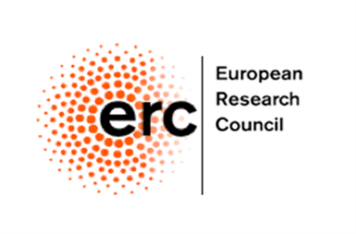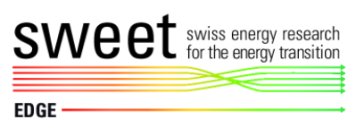Research projects
GREENFIN: Effective Green Financial Policies for the Low-Carbon Transition

The GREENFIN project, funded by an ERC Starting Grant awarded by the European Research Council (EU Commission), started in January 2021.
Mitigating dangerous climate change requires a fundamental transition of global economies. This transition calls for an annual investment of 2–4 trillion USD, which is a multiple of current climate investment. Accordingly, the EU and many countries are enacting green financial policies, intervening in the financial sector to improve financing conditions for low-carbon technologies. Examples include green state investment banks, green finance taxonomies, and changes to lending regulations. However, the effect of these financial policies on investments in non-financial sectors such as energy or transport is largely unknown, and it remains unclear how to make best use of such policies to fill the climate finance gap.
Against this backdrop, the project GREENFIN will combine theory from technology innovation studies and financial economics to derive how different low-carbon technologies require different types of finance, as a starting point for targeted policy interventions. Empirically, novel climate finance datasets will be used, exploiting both structured financial data and unstructured information, drawing on recent advances in machine learning methods (esp. natural language processing). The project aims at delivering specific recommendations for designing more effective green financial policies in the EU and beyond. For more information see the project website: https://cfp.ethz.ch/research/research-projects/greenfin.html
DECARBIN: The impact of energy and climate policy on the decarbonization of industry in Switzerland

The DECARBIN project, funded by a grant from the Swiss Federal Office of Energy in the competitive research call “Energy–Economy–Society”, started in early 2021.
To reach net zero emissions in 2050, Switzerland needs to decarbonize all sectors, including CO2-emitting industries. Policies incentivizing technology options such as electrification of industrial processes could strongly affect the energy system. While much research exists regarding other sectors, e.g. transport, research on deep decarbonization of the Swiss industry is limited to date. Hence, uninformed policy decisions may result in unintended consequences for both industry and the energy system. In this project, we will address this gap by: (i) building a technology-sector matrix that identifies key technologies for the most relevant carbon-intensive industry sectors in Switzerland, (ii) using a techno-economic model to estimate the sensitivities of abatement costs to policy-related input parameters, and (iii) analyzing how energy and climate policy mixes affect the economics of industry decarbonization technologies, how Swiss policies affect the competitiveness of Swiss industry vis-à-vis players in the EU and what are implications for the Swiss energy system.
DemoUpCARMA: Demonstration and Upscaling of Carbon dioxide Management solutions for a net-zero Switzerland

The DemoUpCARMA, funded and supported by the Swiss Federal Office of Energy (SFOE) and the Federal Office for the Environment (FOEN), started in December 2021.
The pilot project lead by ETH Zurich aims to demonstrate the implementation and scale-up of two pathways leading to negative emissions: (1) CO2 utilization and permanent storage in primary and recycled concrete in Switzerland using a novel technology; (2) CO2 transport and permanent storage in a geological reservoir abroad. DemoUpCARMA will assess the optimal design of these pathways and their upscaling potential considering technological, economical, regulatory, political, and societal factors in the mid- to long-term. Negative emissions are an integral component to reduce Switzerland’s greenhouse gas emissions by 2050 to net zero, and to reach the country’s climate goals.
As part of this project, the Climate Finance and Policy Group will first analyze the investment and financing needs along the CCS/CCU supply chain and assess suitable financing sources. In a second step, the effectiveness of potential support instruments will be evaluated. For more information see the following websites: DemoUpCARMA and Carbon Removal Lab
SWEET EDGE: Swiss Energy Research for the Energy Transition - Enabling Decentralized renewable GEneration in the Swiss cities, midlands, and the Alps

The EDGE project, part of the Swiss Energy Research for the Energy Transition (SWEET) program, started in late 2021.
The overall EDGE objective is to fast-track the growth of locally-sourced decentralized renewable energy in Switzerland and to ensure that by 2035 and 2050, when ambitious shares of renewable energy are reached, the Swiss energy system is designed and operated in a technically and economically optimal as well as secure way, and that it is well positioned in the European markets. In a consortium of leading Swiss universities, EDGE will deliver the essential interdisciplinary and transdisciplinary expertise, ranging from technology development to systems modeling, political science, finance, management, economics, sustainability science, and energy practice. The Climate Finance and Policy Group will work particularly on financing challenges related to renewable energy sources (and other innovative energy technologies) in Switzerland, including quantifying the cost of capital for clean energy investments by various actor types. For more information see the project website: external page https://www.sweet-edge.ch/en/home
SPEED2ZERO: Sustainable pathways towards net zero Switzerland

The project SPEED2ZERO connects disciplines and institutions across the ETH domain, to contribute to Switzerland's net zero pathway: halving greenhouse gas emissions by 2030, preparing the infrastructure needed to achieve this, building a resilient energy system and safeguarding biodiversity. Particular, ETH Zurich studies what strategies, technologies, policies, and financial instruments are needed. Thereby, CFP will focus on how financial policies can help. For more information see the project website: https://speed2zero.ethz.ch/
PRISMA: Net zero Pathway Research through Integrated Assessment Model Advancements

The PRISMA project aims to enhance integrated assessment models, which combine climatic and socio-economic modeling, by focusing on four key areas: distributional justice and efficiency, innovation and finance, climate impacts and land-use implications, and lifestyle change and circularity. Within the project consortium, ETH Zurich works on how innovation and finance are represented in current models and on advancing this representation conceptually and empirically. For more information see the project website: external page https://www.net0prisma.eu/